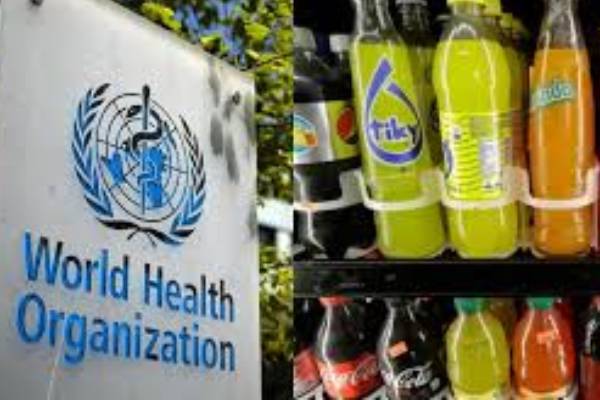From Idu Jude, Abuja
The World Health Organization (WHO) has said that increasing the tax on sugar-sweetened beverages (SSBs) in Nigeria will not place a burden on the population. Instead, the health agency and other experts argue, it could save millions of lives by reducing the risk of non-communicable diseases like diabetes, cancer, and heart disease.
In a growing campaign to protect global public health, WHO is calling on countries—including Nigeria—to raise taxes on sugary drinks, alcohol, and tobacco products by at least 50 percent by 2035. The aim is to discourage unhealthy consumption, ease pressure on fragile health systems, and raise vital revenue that can be channeled into healthcare and social protection.
Experts in Nigeria are lending their voices to this call, warning that the current tax level on sugary drinks—N10 per litre—is far too low to achieve any meaningful change. Professor Olukunmi Lanre, a senior lecturer in public health promotion and nutrition education, noted that the dangers posed by sugary drinks are much greater than most people realize. According to him, many Nigerians can easily switch to local and healthier alternatives if the right policies are put in place.
“We have done much to grow locally made delicacies for Nigerians to reduce the sugar content,” he said. “But it is now left for a proper implementation of policies to carry the message to the general public.” Also speaking at the media engagement, Mrs. Joy Amafah-Isaac, Nigeria coordinator for the Global Health Advocacy Incubator (GHAI), dismissed claims that increasing SSB taxes would harm the economy. She said countries that have implemented similar measures have seen no job losses, contrary to smear campaigns by some industry players. “The campaign against increased tax on SSBs has recorded no loss in any country,” she explained. “Rather, it brings increased value to life and boosts national revenue.”
Economist and researcher Austin Iraoya reinforced this point, stating that countries like the United States, China, South Africa, and Mexico have all introduced sugar taxes without harming their economies or industries. He said companies in those countries simply shifted production to healthier products, such as bottled water.
“These countries never experienced job loss because all companies changed to the production of other products, like water, instead of the SSBs,” Iraoya said. “I can tell you that the few who may, because of poverty, fail to buy junk and sugar-sweetened foods live longer and stay out of hospitals than self-styled rich men who waste money at the supermarkets and the hospitals. It is also noteworthy that a nation with good health is a wealthy nation. This is because citizens of the country can only work to contribute to the nation’s GDP when they are healthy.”
Dr. Joseph Ekiyo, a global health practitioner and researcher, added that completely avoiding sugary drinks is one of the most effective ways to live a longer, healthier life. According to him, most Nigerian staples already contain natural sugars, making added sugar unnecessary.
“I can tell you that total abstinence from SSBs is key to healthy living,” he said. “It is instructive to note that 99.9 percent of staple foods in Nigeria are sugar-related, be it carbohydrates or minerals.”
The WHO echoed this message on its website, stressing that reducing the consumption of unhealthy products through taxation could prevent up to 50 million premature deaths worldwide over the next 50 years. According to the agency, health taxes are among the most powerful tools available to governments.
“Health taxes are one of the most efficient tools we have,” said Dr. Jeremy Farrar, WHO’s Assistant Director-General for Health Promotion. “They cut the consumption of harmful products and create revenue governments can reinvest in health care, education, and social protection. It’s time to act.”
The proposed increase is part of WHO’s “3 by 35” Initiative, a global campaign to raise the real prices of tobacco, alcohol, and sugary drinks by at least 50 percent by the year 2035. The organisation hopes to help countries reduce the burden of non-communicable diseases at a time when healthcare systems are already stretched thin by shrinking aid and rising public debt.
According to WHO, non-communicable diseases now account for more than 75 percent of all deaths globally. The initiative is expected to generate up to $1 trillion in revenue over the next decade, which could be used to fund universal health coverage and essential development programmes.
In Nigeria, the National Sugar Tax Coalition has called on the government to adopt findings from a recent simulation study which showed that raising the SSB tax from N10 to N130 per litre could prevent thousands of deaths caused by sugar-induced illnesses. Oluwafemi Akinbode, Director of Corporate Accountability and Public Participation Africa (CAPPA), lamented the lack of political will and public participation in the fight against sugar-related health issues.
He said: “We need strong political will to save millions of lives and reduce the money spent on treating preventable diseases.”
WHO’s call comes at a critical time. While many countries continue to provide tax breaks to industries that produce harmful products, others—including Colombia and South Africa—have already seen the benefits of health taxes, with reduced consumption and increased public revenue. WHO is urging governments to rethink long-term investment agreements that restrict their ability to increase taxes on harmful products and to reject industry pressure that undermines national health goals.
With strong support from international partners, civil society groups, and academics, the “3 by 35” Initiative is set to guide countries through a mix of policy advice, real-world experience, and technical support. As many nations, including Nigeria, seek to build more self-reliant health systems, health taxes may prove to be a critical step in that journey—one that saves lives and strengthens economies at the same time.

















Leave a comment